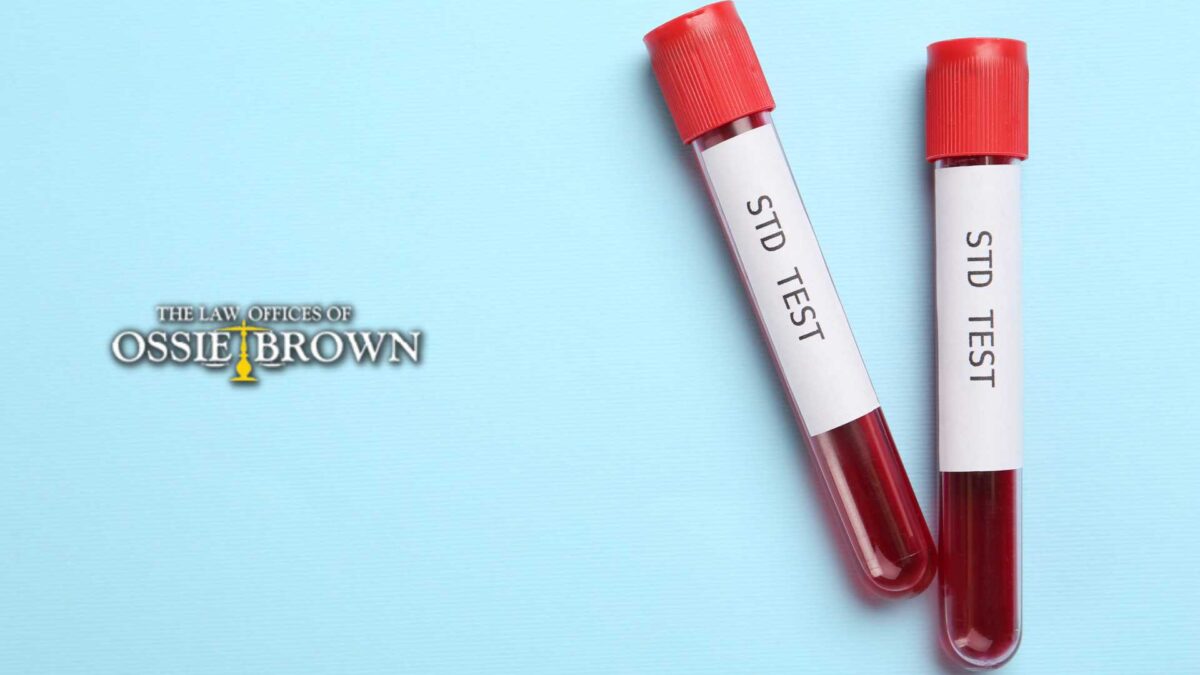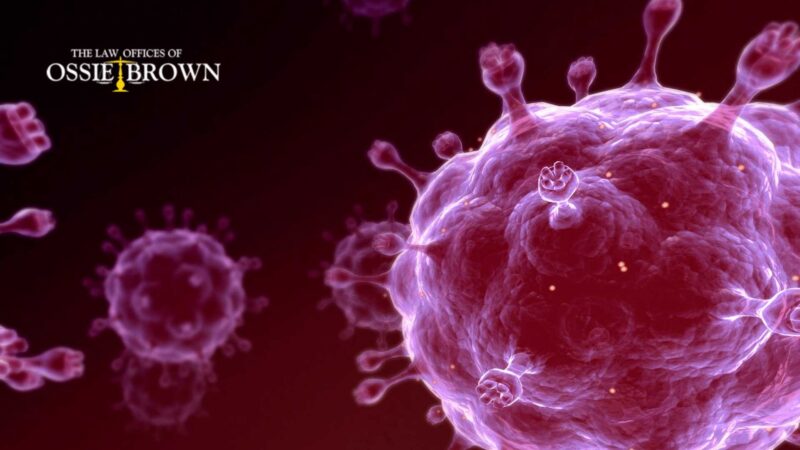Our Baton Rouge sex crimes lawyers are often asked, “What STDs do you legally have to disclose in Louisiana?” Louisiana state laws criminalize HIV exposure. So, an individual must tell their sexual partner about their HIV infection before having any sexual relations with them, as knowingly transmitting the HIV infection without disclosure can lead to criminal charges. While Louisiana’s specific criminalization laws cover only HIV transmission, many states criminalize the non-disclosure of other common sexually transmitted disease (STD) infections. However, Louisiana state laws related to other criminal charges can overlap with sexually transmitted infections.
Our Baton Rouge criminal defense attorneys explain these sensitive criminal laws. If you’ve acted negligently or failed to prevent transmission of communicable diseases to your sex partner or sex partners, our legal team can help you understand your legal options under criminal law as well as in a civil lawsuit.
Call 225-343-1111 to schedule a free consultation with an experienced attorney at The Law Offices of Ossie Brown.
Common Sexually Transmitted Diseases in Louisiana
Louisiana has some of the highest sexually transmitted disease (STD) rates in the United States. These statistics underscore the importance of Louisiana state health departments and public health initiatives to not only prevent transmission but also to promote awareness of sexually transmitted disease (STD) treatment. Here are the most common sexually transmitted diseases in Louisiana.
- Chlamydia: This is Louisiana’s most common sexually transmitted disease (STD). These sexually transmitted infections are spread through sexual contact, often without symptoms, but can cause genital pain and discharge. Typically, when women develop chlamydia-related pelvic inflammatory disease, the technical name changes to sexually transmitted disease (STD).
- Gonorrhea: As Louisiana’s second-highest most common sexually transmitted disease (STD), the gonorrhea infection is spread to sexual partners through sexual contact; symptoms include painful urination and discharge but can be asymptomatic. Gonorrhea falls under sexually transmitted infections until women infected also develop pelvic inflammatory disease.
- Syphilis: These infectious diseases occur by direct sexual contact with syphilitic sores. Typically, symptoms start with sores, then rash, and can lead to severe complications if the infected person doesn’t seek medical treatment.
- Human Immunodeficiency Virus (HIV): This is a serious medical condition, and those who transmit the HIV infection can face criminal charges under Louisiana’s HIV-specific laws. HIV transmission occurs through bodily fluids; symptoms include flu-like illness and can lead to AIDS if untreated.
- Human Papillomavirus (HPV): These sexually transmitted diseases are spread through skin-to-skin contact. HPV may lead to genital warts and is linked to cancers.
- Genital Herpes (HSV-2): Genital herpes is a common sexually transmitted disease in Louisiana, primarily spread through sexual contact with an infected sexual partner. Once a person has developed herpes, they may experience painful blisters in the genital area and flu-like symptoms. Genital herpes is caused by the herpes simplex virus and can be managed but not cured.
- Oral Herpes(HSV-1): Herpes in the oral form spreads through close contact, including kissing or sharing items with an infected individual. People who have developed herpes may experience symptoms such as cold sores or fever blisters around the mouth. While herpes isn’t always transmitted through sex, these sexually transmitted infections can spread to the genital area through contact.
- Trichomoniasis: These sexually transmitted infections are transferred through sexual contact; symptoms include itching, burning, and discharge but may be asymptomatic.
In Louisiana, common sexually transmitted disease (STD) rates are notably high. According to the Centers for Disease Control and Prevention (CDC), this year:
- Louisiana reported 33,759 cases of chlamydia, ranking third in the nation.
- Gonorrhea cases numbered 16,390, placing Louisiana third nationally.
- Louisiana reported 995 cases of syphilis, resulting in a rate of 21.5 per 100,000.
Sexually Transmitted Disease: Public Disclosure Laws Definition
Sexually transmitted diseases public disclosure laws refer to what’s legally required for disclosing a person’s STD status to potential sexual partners. These laws vary depending on the state, but state laws generally aim to protect individuals from unknowingly being exposed to sexually transmitted diseases.
In some states, individuals who knowingly engage in unprotected sex without disclosing their infectious disease may face criminal charges or a civil lawsuit.
The legal elements of a criminal charge or civil lawsuit are related directly to the person’s intentional acts.
While the legal elements for criminal offenses are more stringent, the prosecution must prove that the person’s intentional acts in engaging in sexual relations were against the state’s criminal laws (for states with STD criminalization).
For civil cases, the legal elements include that the person acted negligently or that the person’s intentional acts caused their unknowing sexual partner to have an infectious disease they wouldn’t have had if not for having sexual relations with their infected parents. Damages will be higher for someone who has developed AIDS than for someone who developed herpes, for example, since AIDS is often a death sentence for those infected.
There is no overarching federal law mandating disclosure for most STDs; however, states are legally required to establish and enforce disclosure laws independently.
STD Criminalization Laws
STD criminalization law refers to statutes outlining criminal offenses for those aware they are infected with human immunodeficiency virus or other STDs to engage in risky behaviors without disclosing their infection status.
STD criminalization was largely enacted during the early years of the HIV/AIDS epidemic, with the intent of preventing or controlling rampant and deadly sexually transmitted infections.
These laws vary by jurisdiction, covering a range of activities, including sexual contact, needle sharing, and, in some cases, spitting and biting.
As of 2024, 35 states have their own specific criminalization laws for HIV. The CDC separates these into categories:
- HIV-specific laws criminalize or limit behaviors that can expose another person.
- STD/communicable/infectious disease laws criminalize or limit behaviors that can lead to exposure.
- Sentence enhancement laws don’t criminalize behaviors but can increase the penalties when the perpetrator is infected with HIV and commits specific crimes.
- Does not have specific criminalization laws.
Louisiana falls under the first category and observes HIV-specific laws.
While offenses are typically handled at the state level, federal legislation addressing criminalization applies to situations like prostitution and blood donation.
Federal legislation addressing the criminalization of HIV and other sexually transmitted diseases has otherwise generally remained limited. While many states criminalize certain behaviors by individuals who are knowingly infected with HIV, there aren’t any overarching criminal laws that mandate nationwide STD criminalization. This means that state-specific laws often dictate the crimes and behaviors that are criminalized.
However, in some specific situations, federal legislation addressing criminalization applies. For example, federal laws can impose penalties for blood donation by someone who knowingly has HIV, and in some cases, federal charges may apply if an individual engages in certain behaviors while involved in federal crimes, like interstate prostitution.
There has been growing advocacy to reform or repeal outdated HIV-specific laws, as many public health experts argue that such laws may inadvertently discourage potentially infected individuals from seeking HIV testing and treatment for the medical condition. Public health organizations suggest that such laws often create stigma rather than effectively prevent transmission. However, until such changes are universally adopted, current state laws and limited federal laws continue to impact individuals living with HIV or other sexually transmitted diseases across the U.S.
Is It Illegal to Give Someone an STD in Louisiana?
In Louisiana, intentionally or negligently transmitting an STD to another person can have legal consequences. The legality surrounding the transmission of a sexually transmitted disease depends on various factors, including the nature of the STD, the awareness of the infected individual, and the circumstances of transmission.
State laws specifically address the intentional exposure of another person to an STD, particularly when the infected individual is aware of their condition and fails to inform their partner. Such actions can lead to criminal penalties.
Oral and Genital Herpes Disclosure Laws By State
State laws for disclosing oral herpes and genital herpes vary significantly, but California is the only state that specifically criminalizes the non-disclosure of genital herpes or oral herpes.
This means that in California, if someone has developed herpes and knowingly exposes a sexual partner to the herpes infection without informing them, they can face criminal charges.
While many states criminalize the non-disclosure of other STDs like HIV infection, there are no explicit state laws requiring oral herpes or genital herpes disclosure in other states.
However, individuals who have developed herpes and fail to inform a sex partner risk a civil lawsuit for knowingly transmitting herpes. Ultimately, while state laws related to herpes disclosure differ, ethical considerations to prevent transmission strongly support open communication with sexual partners if someone has developed herpes. It’s important to note that while this isn’t technically legally required, while you can receive medication to reduce breakouts, those who have developed herpes cannot be cured of the herpes infection.
Given the variability in state laws related to disclosure of sexually transmitted infections, like oral or genital herpes, individuals who have developed herpes should consult local state laws or seek legal counsel to understand what’s legally required for disclosure of the herpes infection as well as their legal options if they have spread genital herpes or oral herpes.
Is It Illegal To Not Tell Someone You Have HIV in Louisiana?
Yes, in Louisiana, it is illegal to knowingly fail to disclose an HIV (human immunodeficiency virus) status to sex partners before engaging in sex, whether this is unprotected sex or not. Under Louisiana R.S.14:43.5, the criminal laws specifically criminalize HIV exposure, making it legally required for an HIV-positive person to inform any sexual partner of their HIV infection before potential HIV transmission can occur.
Preventive measures, such as pre-exposure prophylaxis (PrEP), are available to help partners reduce transmission risk and manage or reduce breakouts. However, if an HIV infection turns into acquired immunodeficiency syndrome (AIDS), this can be a death sentence for the person infected.
This criminal law or statute is part of Louisiana’s HIV-specific laws that penalize individuals who acted negligently or knowingly risked HIV exposure to sex partners without disclosure, regardless of whether HIV transmission occurred. The person’s intentional acts are a critical factor in determining the severity of the offense under Louisiana’s HIV-specific laws, as the state can prosecute an HIV-positive person who failed to warn a sexual partner, regardless of whether their sex partner contracted the HIV infection.
Violations may also be reported to the local health department as part of Louisiana’s efforts to manage sexually transmitted diseases and protect public health. Legal options are available, and those facing charges should seek advice from lawyers experienced in Louisiana criminal law regarding sexually transmitted diseases on what’s legally required and legal options.
Is It Illegal To Give Someone AIDS in Louisiana?
Yes, it is illegal to knowingly expose or transmit acquired immunodeficiency syndrome (AIDS) in Louisiana. Louisiana has strict sentence enhancement laws for HIV transmission, which can lead to acquired immunodeficiency syndrome, to another person without disclosure. This act is treated as a serious offense, and in some cases, it has been described as a “legal death sentence” due to the life-altering consequences for AIDS victims.
The legal elements in AIDS exposure cases include proving that the person was aware of their medical condition, deliberately withheld information from their sex partner, and engaged in sexual relations, such as unprotected sex, likely to transmit the virus to one or more sex partners. Those infected with AIDS are also legally required to notify any sexual partner and, in some cases, may have reporting obligations with the local health department. For those facing charges related to transmitting serious sexually transmitted diseases, consulting a lawyer is essential.
If you’ve had sexual relations and didn’t disclose any potential communicable diseases with your sex partner before sexual contact in Louisiana, contact our law firm for a free consultation.
If You Let Your Partner Know You Had an STD Beforehand, Can You Be Charged in Louisiana?
In Louisiana, whether a person can face criminal charges after disclosing sexually transmitted diseases to sex partners beforehand depends on the specific criminalization laws and the type of disease involved.
While it is generally legally required to inform partners of certain sexually transmitted infections and sexually transmitted diseases, Louisiana’s laws do not necessarily protect someone from all charges simply because they disclosed their infected status. Laws vary by state and vary depending on the severity and risk involved with the specific infectious disease.
Louisiana’s laws specifically criminalize HIV exposure, even if the infected person has disclosed their status if they knowingly engage in sexual relations or acts that could transmit the HIV infection.
For other communicable diseases, the potential for charges may be lower, especially if no symptoms were present or if the person sought advice from a healthcare provider regarding safe practices. Because these laws can be complex and specific to the disease, it is essential to understand Louisiana’s disclosure requirements for sexually transmitted diseases.
HIV Exposure and Informed Consent in Louisiana
Under Louisiana law, individuals who are aware of their HIV-positive status are required to disclose this information to potential sexual partners before engaging in sexual relations. The concept of informed consent plays a pivotal role here, as it requires that the consenting party be fully aware of the HIV-positive status of their sexual partner and understand the risks involved in proceeding with any sexual contact.
Failure to disclose one’s HIV-positive status before engaging in activities that pose a risk of STD transmission, like unprotected sex and needle sharing, can lead to fines and jail sentences.
Do You Report HIV to the Local Health Department in Louisiana?
Yes, in Louisiana, every healthcare provider is legally required to report HIV infection cases to the local health department as part of the state’s public health monitoring and efforts to prevent citizens from knowingly transmitting sexually transmitted diseases.
When a person is diagnosed with an HIV infection, the local health officer or relevant health departments are notified to ensure appropriate follow-up, support, and preventive measures. This reporting helps health departments track the spread of HIV, provide resources for those who have an HIV infection, and develop public health strategies to reduce transmission within the community. Reporting is managed by each healthcare provider confidentially to respect patient information while following the specific laws for reporting HIV.
Is Giving Some an STD Assault in Louisiana?
Knowingly transmitting sexually transmitted diseases to partners without their informed consent can be considered a form of sexual assault under Louisiana’s criminal laws. This is based on the principle that genuine consent requires full awareness and understanding of the risks involved in sexual contact, including the risk of contracting life-altering STDs, AIDS, or other STDs with lasting effects, like genital herpes or genital warts. When a person knowingly withholds information about their status regarding a serious infectious disease, chooses to knowingly engage in any form of sexual contact, and transmits one of the many sexually transmitted diseases in Louisiana, it undermines the partner’s ability to make a fully informed decision, potentially classifying the act as sexual assault.
Can You Be Charged With Reckless Endangerment for Knowingly Transmitting an STD in Louisiana?
Yes, in Louisiana, a person can potentially be charged with reckless endangerment if they knowingly transmit certain sexually transmitted diseases, depending on the circumstances. Louisiana’s specific criminalization laws include HIV-specific laws that criminalize intentional or reckless behavior that risks transmitting the human immunodeficiency virus, but reckless endangerment charges may also apply to other STDs if the transmission was intentional or posed a severe risk to the other person.
Prosecutors may pursue reckless endangerment charges if a person is aware of their STD status and chooses to knowingly engage in sexual contact or actions likely to transmit the infection without informing their partner. Louisiana’s approach reflects its commitment to public safety, where criminal laws are used to address those who intentionally harm or acted negligently in cases involving sexually transmitted diseases.
Do You Have to Register as a Sex Offender If You Have HIV in Louisiana?
In Louisiana, individuals with HIV do not automatically have to register as a sex offender simply because of their diagnosis. However, under Louisiana’s “intentional exposure” law, a person who knowingly exposes others without disclosure may face charges that could, in specific cases, lead to sex offender status. For instance, if a person with HIV engages in reckless endangerment by intentionally exposing someone to the virus without informing them, they could be charged with a serious offense.
Such a conviction might place them in one of the sex offender tiers Louisiana uses to classify offenders. Reporting exposure incidents to the health department or a healthcare provider is part of Louisiana’s public health efforts, but the Louisiana sex offender registry is generally reserved for cases in which a person’s intentional acts harm another person.
Penalty for Knowingly Infecting Someone With HIV in Louisiana
In Louisiana, the penalties for intentional HIV transmission are stringent and can lead to severe legal consequences. Under reckless endangerment law and other relevant statutes, a person who knowingly transmits HIV without disclosure can face up to 10 years in prison with or without hard labor and/or $5,000 in fines.
This offense is taken seriously because it involves sexually transmitted diseases and the intentional risk posed to others’ health. If convicted, the court may increase penalties due to sentence enhancement laws that apply to cases involving deliberate exposure to an infectious disease.
The health department may be involved if transmission is reported, as they help manage cases to protect public health and reduce the further spread of sexually transmitted diseases.
Can You Sue Someone For Giving You an STD in Louisiana?
Yes, in Louisiana, you can sue someone for giving you an STD if you can prove they chose to knowingly engage in sexual relations without informing you of their infectious disease.
Legal claims for sexually transmitted diseases often arise when an individual acted negligently or knowingly exposed another person to a serious infection like herpes, HPV, gonorrhea, or human immunodeficiency virus. The success of such civil cases for sharing sexually transmitted diseases can vary depending on whether the person was legally required to disclose their status and if they failed to do so responsibly.
When symptoms appear, or if you are infected with a long-term infection such as genital warts from HPV or more serious communicable diseases like AIDS or HIV, it is possible to seek compensation for damages, including medical costs and emotional distress.
Consulting a personal injury attorney in Baton Rouge, Louisiana, can help you explore legal options, what’s legally required from each partner, and the legal elements involved in pursuing a personal injury lawsuit. Our experienced attorneys can advise on gathering evidence and pursuing a claim if the person exposed you to other STDs in violation of Louisiana’s legal standards.
Facing Criminal Charges for Intentional STD Exposure in Baton Rouge?
If you’re facing criminal charges for intentional STD exposure in Baton Rouge, it’s critical to seek experienced legal representation immediately. The Baton Rouge sex crime attorneys from The Law Offices of Ossie Brown understand the sensitive nature of allegations related to sexually transmitted diseases and are dedicated to upholding your rights and dignity throughout the legal process.
With our extensive experience and a deep understanding of Louisiana’s legal landscape, we are ready to defend you and strive for the best possible outcome. Don’t let these charges define your future. Call The Law Offices of Ossie Brown at 225-343-1111 to meet with an experienced Baton Rouge criminal defense attorney today.





